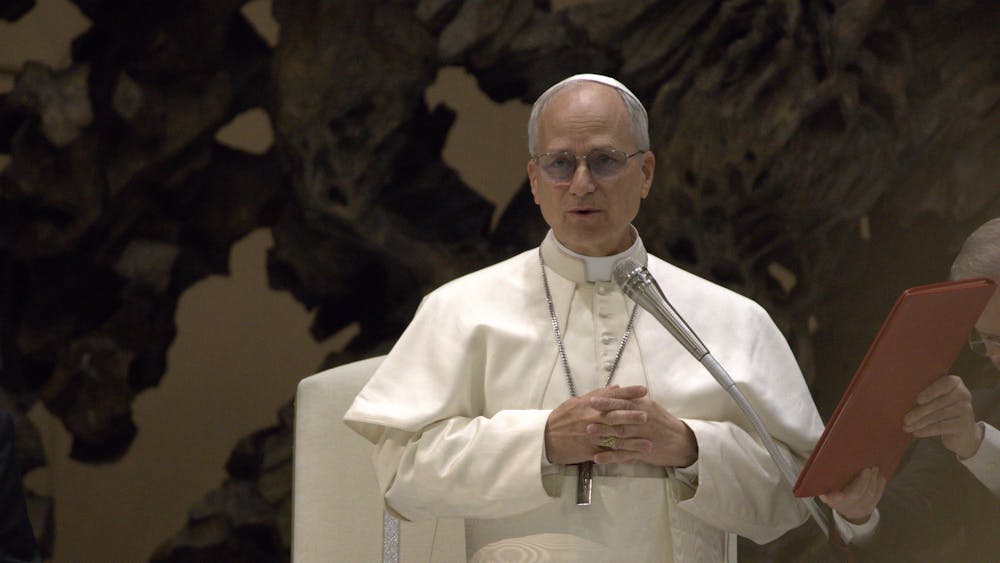At their weekly Wednesday night meeting, the Notre Dame student senate met with the Financial Management Board (FMB) Student Union treasurer Christine Arcoleo in a follow-up to a previous meeting two weeks prior. The presentation from Arcoleo, a senior, sought to clarify some of the senators’ previous questions.
According to numbers provided by Arcoleo, across all student government organizations there was a net $77,000 left in surplus from the previous fiscal year. The student government also ran a surplus in the years prior. This number is down from previous years primarily due to issues with the budgeting of the Midnight Express. Only one to three individual student government organizations were running a deficit.
When asked why the FMB frequently ran a deficit, Arcoleo said the FMB underestimates its actual budgetary needs and the budget is often based off precedent.
“We have not been reconciling how much we are actually spending because the person who spends most of it is not myself, it’s just somebody that I work with,” Arcoleo said.
Some senators were surprised to learn how much funding the student government actually does not spend every year. One concern was raised about why student government was not spending all of its funds.
“Is there a reason why every year we get to the end of the year and we have over $100,000 left?” Jackson Oxler, a sophomore senator from Duncan, said. “Why are we not using that money if it’s being allocated to us to provide things for the students?”
(Editor’s Note: Oxler is a news writer for The Observer).
Arcoleo explained that many organizations budget with a certain set of events in mind then do not follow through with every event and are sitting on unused funds, or that there may be unforeseen events causing a large amount of spending or saving. Eric Kim, a senior and executive director of SUB, provided an example of an unforeseen event leading to unspent funds.
“For the 2017-18 fiscal year, that was the year we were going to bring GoldLink to campus but he cancelled four hours before the concert, so [SUB] had $40,000 left over because of that,” Kim said. “That was an unforeseen circumstance in our situation.”
Another response to the surplus was the sentiment that some of the funds should be reallocated towards funding the Club Coordination Council (CCC) and other clubs. The senate previously met with CCC chair senior Jordan Isner to discuss funding going forward.
“I still think — going back to the CCC presentation — that Jordan did a good job showing that CCC still has substantial need even with a 3% point increase [in total allocated funds],” Quentin Colo, an off campus senior, said. “I still believe CCC needs more money.”
Just like the last meeting with Arcoleo, senators believe some form of financial accountability should be in place even if the matter is not urgent right now.
“From the numbers, it doesn’t seem like there is a need for accountability measures, but then that doesn’t necessarily mean that there shouldn’t be accountability measures — right now there’s no issue, but there’s nothing in place to prevent issues from happening,” James Bathon, a senior from Keough, said.
The most discussed options for more accountability at the meeting include a higher emphasis on the winter budget meeting the FMB conducts, requirements in either the FMB’s bylaws or the constitution that student government organizations meet with the FMB to discuss spending, requirements that organizations spend a certain percentage of their allocated budget every year and reallocating extra funds to other student government organizations.
After senate adjourned, Arcoleo explained her plans to make FMB more effective this year and particular accountability measures that she favored.
“I’m going to have to monitor organization expenses more closely this year; I’ll be checking in with the FMB this year to make sure they’re OK with being scrutinized more closely,” Arcoleo said. “I think I’ve gained a lot of insight from this whole process through senate, and in the future, for the winter reallocation and the spring allocation, we will definitely make polling the numbers that I showed today part of the whole allocating process. In particular, holding the organizations accountable, make sure we’re every month reconciling what they’ve spent and comparing it to their overall allocation and the budget they sent me last year. The thing I’m more excited for is the winter reallocation process.”
After the discussion, senate deliberated a resolution written by sophomore Allan Njomo, the senator representing Stanford Hall. The resolution sought to rename the “Freshman Class Council” to the “First Year Class Council.” The resolution passed.
Read More
Trending









